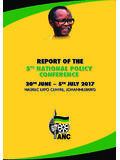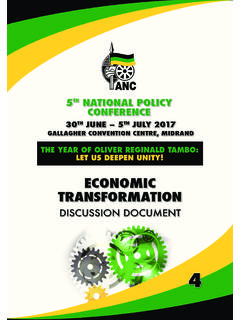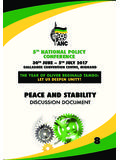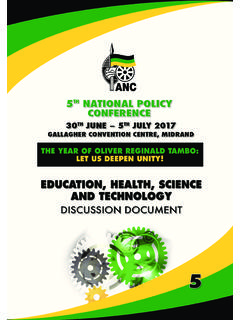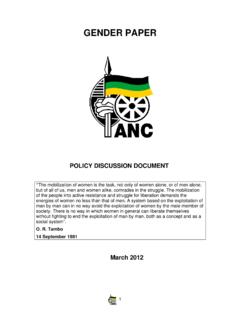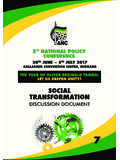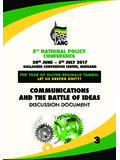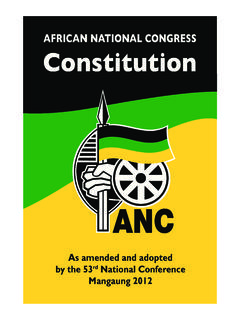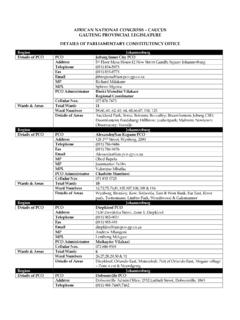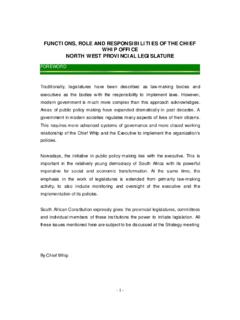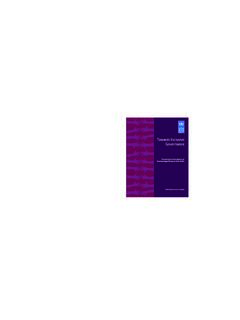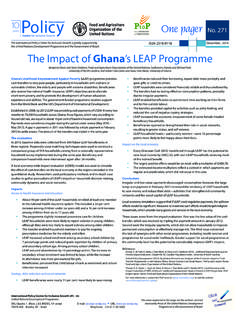Transcription of INTERNATIONAL RELATIONS - African National …
1 National policy CONFERENCE | DISCUSSION DOCUMENTS30TH JUNE 5TH JULY 2017 GALLAGHER CONVENTION CENTRE, MIDRAND5TH National policy CONFERENCETHE YEAR OF OLIVER REGINALD TAMBO: LET US DEEPEN UNITY! INTERNATIONAL RELATIONSDISCUSSION DOCUMENT9 National policy CONFERENCE | DISCUSSION DOCUMENTSINTERNATIONAL RELATIONS9 The ANC in an unpredictable and uncertain world that is characterised by increased insecurity and the rise of populism: AN ANC NEC INTERNATIONAL RELATIONS SUB-COMMITTEE DISCUSSION DOCUMENT TOWARD THE 5TH National policy CONFERENCEINTRODUCTIONBoth the National Conference in Mangaung in 2012 and the National General Council of 2015 observed that material conditions continue to change in ways that are unpredictable and 1994 democratic breakthrough in South Africa happened in the midst of tectonic shifts in global power as epitomized by the rise of China and other emerging powers, the continued decline of the hegemonic dominance and influence of the United States as the global super-power (acting frequently to defend that position)
2 , and greater contestation in the United Nations and INTERNATIONAL organizations over matters of the use of power and resolution of problems that global capitalism and imperialism generate. Today, the clarion call of the Freedom Charter declaring that There Shall Be Peace And Friendship! remains as relevant as in observed in 2012 and 2015 discussion documents, the global economic crisis that we are yet to recover from was symptomatic of the unjust nature of global capitalism and the manner in which global power is used to advance the narrow National interests of powerful states. The global economic recovery remains slow and sluggish, putting at risk the goals to end poverty, unemployment and inequality and the goals to achieve inclusive and just economic development.
3 These economic conditions are detrimental to the rise of the developing world. It undermines the potential of the South African economy to recover and become inclusive and resilient, affecting negatively our pursuit of the goals of the National Democratic Revolution as expressed in the National Development Plan. It also undermines the actualisation of south-south cooperation into prosperity for poor nations. 1 National policy CONFERENCE | DISCUSSION DOCUMENTS2 Simultaneously, it encourages powerful countries to exercise economic protectionism, to the detriment of efforts to build development-friendly global multilateral trade regimes. It leads to powerful countries stone-walling the Doha Round of trade negotiations under the auspices of the World Trade Organization, as witnessed in Bali in 2014 where the aspirations of the developing world were thwarted.
4 The gulf between the industrialized North and the developing South is exemplified in the negotiations over climate change, among others. Yet, still emerging economies have registered economic growth rates higher than most of the developing world, helping them to absorb the pressures arising from the global economic crisis that the industrialized North is largely responsible for. As the bigger countries of the South accelerate past some of the G7 economies, their confidence and assertiveness in global affairs also grows. This state of the world presents a mixture of opportunities and challenges for South Africa. One of the challenges is whether our foreign policy is sufficiently flexible to respond to these changing dynamics. A second is whether our institutions, including diplomatic services, are geared towards strengthening our position in spite of negative trends and to harness opportunities arising from positive changes such as growing South-South third challenge is how we could grow our economy under the conditions of slow global economic growth.
5 This must take into account what big industrialized countries do or don t do in relation to economic governance. Fourthly, how do we harness the activism of non-state actors and different spheres of government like provinces and municipalities, in order to expand beneficial INTERNATIONAL RELATIONS . Finally, what does the idea of National interest entail in conditions where global and local realities, principles, values and institutions are interconnected? In this context, how do we reconcile National interest with the pursuit of pan-Africanism and a progressive internationalist movement?HISTORICAL MANDATE OF THE ANC: A PROGRESSIVE INTERNATIONALISMP rogressive internationalism is a radical perspective of INTERNATIONAL RELATIONS that the liberation movement developed out of the struggle for liberation.
6 It is born out of its interaction with fellow liberation movements throughout the world and INTERNATIONAL solidarity movements. It is radical in that it entails opposition to the perpetuation of the legacy of global imperialism manifest in the global power asymmetry, the dominance of the global North over the South and the world, structural global inequality and poverty. Paradigms of violence and the global world manifest in militarization of INTERNATIONAL RELATIONS , global racism and patriarchy, neocolonialism and other ills that delay the development of both a new truly post-colonial world system and an inclusive globalized economy. It envisages a just, equitable, non-racial, non-patriarchal, diverse, democratic and equal world system. It requires the building of alliances and solidarity with progressive forces in the South and North fighting for similar objectives in world affairs.
7 The NGC discussion document of 2015 correctly points out that the liberation struggle in which progressiveness is born began when the colonial/imperial project expanded to the South in the 15th to the 19th century. In this period, the world witnessed the rise of a global system of imperialism as the basis of a modern world system that continued to perpetuate unequal power RELATIONS . The colonization of South Africa since 1652, almost two hundred years after Vasco da Gama, had rounded the Cape, was intimate element of the global imperial process. Hence, the liberation struggle was about the National question and the INTERNATIONAL situation. The period between the calamitous conference of colonial empires in Berlin in 1884-5, which decided on the colonial scramble for Africa, and the achievement of independence from the 1960s saw the growing internationalization of anti-colonial struggles through alliances and solidarity campaigns.
8 This internationalist outlook of the African struggles is epitomized by the Pan- African Conferences that took place between 1900 and reached their heights in the 1950s. In the backdrop of the so-called Second World War as the Western world developed the Atlantic Charter as a set of principles to govern world affairs, the movement developed an alternative set of principles and rights contained in the African Claims. This envisaged a world shaped not just by the aspiration and interests of the Western world, but one also shaped by African demands. It thus made clear its opposition to the imperial idea of a world system designed without the consultation of peoples outside the West. Progressive internationalism also draws from the experience of the movement as an active participant in the making of a global South solidarity challenging the North-dominated post-World War 2 world order that found its most prominent expression in the Afro-Asian Solidarity Conference in Bandung, Indonesia, in 1955.
9 The Bandung Conference sent a strong signal that a world system cannot be built on the basis of our exclusion, exploitation, domination, marginalization and without our input. It cemented the foundations of the solidarity of progressive forces of the South National policy CONFERENCE | DISCUSSION DOCUMENTS3emerging to contest the onset of new imperialism under the leadership of the US as the dominant global power after war. It also outlined a vision of South-South Cooperation in the form of solidarity with unfinished struggles against colonialism and apartheid as well as socio-economic and political co-operation among independent countries of the South. It is from this that the principles of self-reliance, sovereign equality of states, sanctity of National sovereignty, solidarity and non-alignment in the Cold War between the East and West emerged.
10 These principles remain critical in the progressive movement throughout the movement with the Non-Aligned Movement (NAM), the World Peace Council (WPC), the Afro-Asian People s Solidarity Organization (AAPSO), and the Organization of Solidarity for Peoples of Africa, Asia and Latin America (OSPAAL), and many other vehicles for progressive INTERNATIONAL solidarity. The expansion of the INTERNATIONAL solidarity pillar of the anti-apartheid struggle after the banning of the liberation movements and the incarceration of its top leadership in the 1960s was a critical moment in the history of the global progressive movement. Anti-apartheid solidarity movements mushroomed all over the world, helping to place the South African struggle on the world map and connecting it to the other global struggles.
